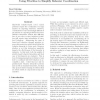Free Online Productivity Tools
i2Speak
i2Symbol
i2OCR
iTex2Img
iWeb2Print
iWeb2Shot
i2Type
iPdf2Split
iPdf2Merge
i2Bopomofo
i2Arabic
i2Style
i2Image
i2PDF
iLatex2Rtf
Sci2ools
ATAL
2007
Springer
2007
Springer
Using priorities to simplify behavior coordination
Real-world behavior-based robot control problems require the coordination of a large number of competing behaviors. However, coordination becomes increasingly difficult as the number of competing behaviors increases. Behavior hierarchies address this difficulty, but do not solve it since high-level behaviors still require state information of lowerhaviors. Abstracting the state of lower-level behaviors through priorities removes this restriction, which should allow the behavior hierarchy to better scale. However, or not this abstraction negatively impacts the effectiveness of the hierarchy is unknown. In this work, both the quality of priority-based behavior hierarchies and their ease of development are evaluated. This is done by using grammatical evolution to learn how to coordinate low-level behaviors to accomplish a task. I show that not only do priority-based behavior hierarchies perform just as well as standard hierarchies, but that they promote faster learning of solutions that...
| Added | 07 Jun 2010 |
| Updated | 07 Jun 2010 |
| Type | Conference |
| Year | 2007 |
| Where | ATAL |
| Authors | Brent E. Eskridge, Dean F. Hougen |
Comments (0)

